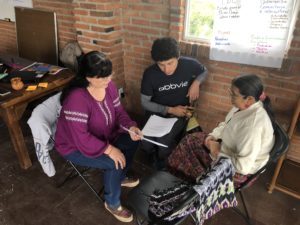At a recent gathering of six Vista Hermosa Foundation grantee partners near Mexico City, one of the participants from Amextra, a Baptist pastor, opened our time together with this simple exercise: ‘Te veo, Te escucho, Te honro.’ We all stood in a circle, and each person said their name, followed by the whole group repeating the person’s name and saying ‘I see you, I hear you, I honor you.’ What a meaningful way to connect deeply at the beginning of our four days together.
Following up on a 2018 partner retreat and interest from several organizations about combating violence against women and girls in their own urban and rural communities, Vista Hermosa has worked with Raising Voices to begin the adaptation of their SASA! methodology from its roots in Uganda and its travels through several other African countries and Haiti. This unique, evidence- and community-based curriculum unpacks power, both its positive and negative uses, and addresses the heart of the problem through a step by step process that involves many people across all levels of society to create social norm change. Studies have shown that the level of physical partner violence against women was 52% lower in SASA! communities than in control communities. Now this powerful anti-violence curriculum is being adapted for Mexico and Central America using the expertise of these six VHF partners and other organizations in Honduras.
Throughout the week, the group gave feedback about many of the curriculum’s elements and activities, which include graphic-novel like illustrations, posters and scenarios designed for low literacy communities including men and women, youth, and elders. The comments ranged from the very granular (“that color T-shirt is associated with a corrupt political party”) to the more conceptual (“let’s use the pronoun ‘us’ instead of ‘you’. We [trainers] also need this training. We are working on the same issues, and we don’t have it all figured out”). Participants stepped up to lead sessions, trying out language and role plays. The group had fun with energizing icebreakers and a quick field trip to the nearby pyramids of Teotihuacan.
As an observer throughout the week and someone from a different culture and background than the rest of the group, I looked for themes that connect across borders as I learned more about the methodology and had the opportunity to be in community with the individuals and their respective organizations. Here are a few themes that resonated:
- Solidarity/Allyship: how do we better reach across differences to stand with each other in difficult times?
- Intersectionality: how do we integrate and celebrate all of our identities as we support each other in community?
- Representation matters: communities need to see themselves in materials, be it images of place, race, gender, social class, disability, etc.
- Whatever place or position we find ourselves in, we must use our power for good.
- Self care is paramount in trying times, as is telling positive stories of transformation when we are surrounded by so many negative and traumatic ones.
We look forward to continuing this important work with our partners in Mexico, Central America, and elsewhere, including the US, in order to create thriving, healthy, holistic relationships and communities.
Written by Susan Dobkins, VHF Programs Director


